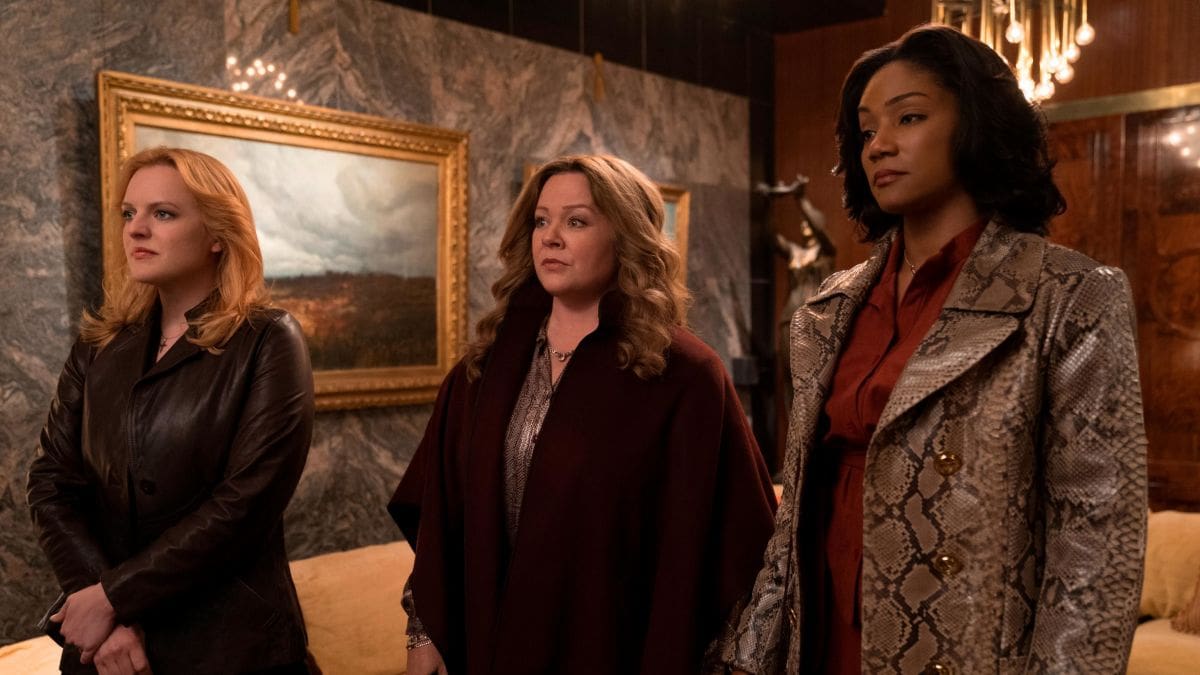
The Kitchen, on paper, should’ve been a good, if not great movie. The absolutely stacked cast is lead by two-time Oscar nominee Melissa McCarthy, multi-time Emmy award winner Elisabeth Moss, and red hot comedic actress Tiffany Haddish in her first dramatic leading role. The screenwriter and director Andrea Berloff, was nominated for a Best Original Screenplay Oscar for Straight Outta Compton. The source material is an acclaimed DC Vertigo comic about three women who take over the Irish mob and run Hell’s Kitchen, is a fresh take on the heavily traversed mob movie genre.
On paper, all of these moving parts should’ve lead to an intense, character-driven, mob movie that subverts the expectations of every gangster-centric film before it. Instead, The Kitchen relies too heavily on stylistic embellishments of tired mob movie cliches and employs a tell don’t show approach to storytelling. Montages litter this movie, and plot twists and character development are “covered” in quick speeches by the three leads. The movie asks the audience to assume a lot about what happens in the film, and the women’s motivations. This amount of mental lifting kneecaps the film, as the audience has to fill in a lot of story and emotional gaps, while keeping up with the breakneck turns the plot takes.
The film’s overuse of montages embodies the main problem with the film. The use of montages is a staple of mob movies, whether it’s the fall out of the Lufthansa Heist in Goodfellas, or the baptism scene in The Godfather. And we know how they work — there’s a plan made and the montage shows the execution of the plan. The Kitchen implements montages nearly every single time a new plot point is introduced. The overuse not only makes for an uneven pace, but it never allows for plot points to breathe. The audience can never let things sink in because the film is rushing off to the next thing.
Also, everything moves too quickly, and worst of all, too efficiently. The women’s rise to power is met with little resistance, and any time there’s resistance it’s resolved in either montage form, or in a quick, sudden moment. Rarely do you feel these women, who are struggling against men who don’t want them to succeed/want them dead, are in peril. The script seems more interested in the women allowing power to go to their heads and turn on each other (another mob movie cliche) rather than anything else. In short, for a crime drama, there’s a whole lot of crime and not a lot of drama.
Luckily, there is still a lot of good in this film, and that comes directly from the incredible cast. McCarthy, Moss, and Haddish have a dynamite, lived in chemistry. Their individual takes on a similar character — a woman being held back by years of patriarchy who come to realize their own internal power — is what keeps you engaged. While their motivations are assumed, and the dialogue given is sometimes painfully cliche, each woman makes an impact statement with their character.
Haddish probably gives the most impressive performance as her character’s arc is so all over the place, yet she gives a determined, steely, and ferocious performance throughout. It’ll be great to see her in more dramas down the road. Of the men in the film, Domhnall Gleeson is wildly impressive playing a psycho killer who falls in love with Moss’ character. Gleeson is against type her, forgoing his clean cut, very British demeanor for a quiet killer with a heart of tarnished gold. Gleeson and Moss have an insane chemistry, and it would’ve been great to see more of them in a different movie.
The Kitchen is a film that had the potential to be something great. Instead, it’s a movie that’s fine at best, and ultimately forgettable. It’s reliance on the style, and the sizzle of a mob movie, and not the dramatic force of its cast, and source material is extremely disappointing.

